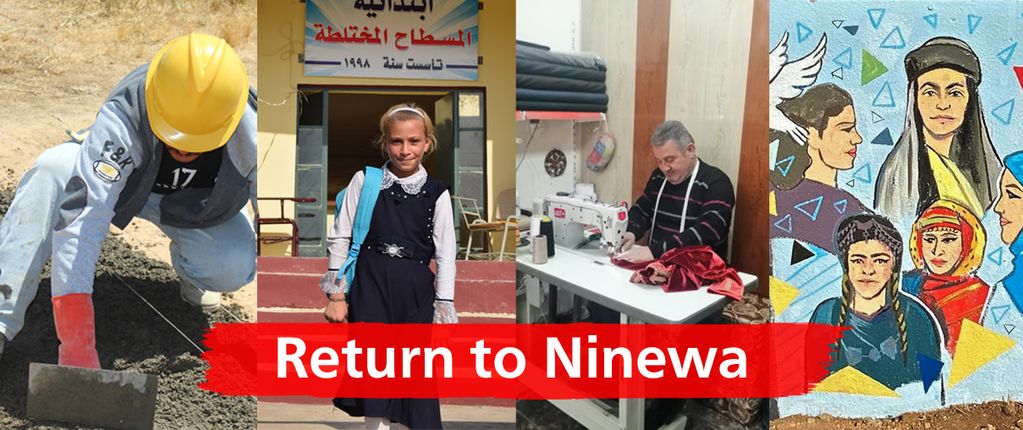
This project has been completed.
Ninewa Return Program in Iraq
Restoring homes and prospects for returnees
The Nineveh (Ninewa) Plains stretch north and east from Mosul in northern Iraq and is home to various ethnic and religious groups including Christians, Yezidis, Shabak, Kakaes, and Muslims. When the self-proclaimed Islamic State (IS) took over Mosul in June 2014, a campaign of terror and persecution led to severe devastation in a number of villages and the mass displacement of hundreds of thousands of people from various ethnic and religious groups.
In late 2016, a military campaign to liberate the region led to further devastation. This and fears of hidden mines as well as a lack of future prospects have made it difficult for the displaced to return to their ancestral homes.
Malteser International's reconstruction program is focussing on repairing damaged or completely destroyed homes, assisting small and medium-sized businesses to make a fresh start, creating jobs and vocational training centers, improving the school system, and promoting social cohesion and peaceful coexistence between the various ethno-religious groups.
Stronger together: We have developed the program together with our partner Aid to Church in Need (ACN) in Germany and are working closely with several Iraqi and international partners on the ground to ensure our efforts are locally anchored and have a lasting impact.
Nineveh is a culturally rich province inhabited by members of diverse ethnic and religious groups. Christians, Yezidis, Shabaks, and Kakes as well as Muslims have lived in the region.
In June 2014, IS declared a Caliphate in Iraq, seizing control of Mosul and most of the Nineveh Plains. The group then targeted many Christians, Yezidis, Shabaks and many other groups for persecution, destroying their homes and places of worship as well as historical sites. As many as 6 million people were forcefully uprooted from their homes as a result of IS terror.
Two years later, in late 2016, a joint military operation between Iraqi forces and the Kurdish Peshmerga liberated the Nineveh Plains from IS control. However, the fighting led to further devastation in the region. As of early 2018, there were still 2.6 million internally displaced persons (IDPs). According to the International Organization for Migration (IOM), 90 per cent of them plan to return home.
Many IDPs are still living in camps for displaced persons. The government has already announced that it will soon close the camps and suspend humanitarian aid. To help those displaced return to their homes, there is an urgent need to rebuild destroyed houses.
The returnees should be able to feel at home again in the Ninewa Plains. Therefore we want to achieve these aims:
- Reconstruction: Those displaced from the Ninewa Plain can live in their old houses again.
- Secure livelihoods: Small and medium-sized enterprises can resume their operations. Young people can acquire vocational skills.
- Peaceful coexistence: Members of different ethnic backgrounds and religions live and work together peacefully
- Education: The children of the Nineveh Plains can attend kindergarten and school again.
Our comprehensive range of activities is designed to restore a lively and peaceful daily life to the Nineveh Plains to enable residents to settle and re-establish themselves there. The project activities include the following measures:
Reconstruction:
- We are rehabilitating homes and rebuilding completely destroyed houses.
Income security:
- We are offering training courses in crafts, construction techniques, agricultural techniques and business management.
- We are enabling small and medium-sized enterprises to restart business.
- We are organizing annual agricultural markets.
- We are renovating agricultural infrastructure such as greenhouses, poultry farms etc. and restoring irrigation systems for agriculture.
Peaceful coexistence:
- We are rehabilitating community spaces for all ethno-religious groups to include kindergartens, sports fields and multipurpose halls.
- We are training advocates and activists with respect to human rights, minority rights and lobbying and are organising campaigns to disseminate knowledge.
- We are establishing youth centres for inter-cultural activities, sports, leisure actvities and vocational training.
- We are encouraging women and men to participate in intercultural activities and events.
- We are training community mediators on conflict prevention
- We are reaching the general public through radio broadcasts on topics related to peaceful coexistence.
Education:
- We are rehabilitating and expanding schools
- We are training teachers on child-centered paedogical practices and issues relating to psychosocial care in order to respond specifically to the needs of traumatised schoolchildren
Our partners consist of experienced local and international aid organisations and church partners who have expertise in their respective fields. We are also coordinating our activities with ministries and local authorities, churches, faith leaders, and the UN Shelter, Livelihood, and Education clusters.
See our program factsheet for more information.
County info
Capital: Bagdad
Area: 437.072 km²
Population: approx. 33.4 million
Project data
Partners:
Local Reconstruction Committees of the Syrian Catholic Church
Syrian Orthodox Church and the Chaldean Catholic Church
Christian Aid Program Nohdra Iraq (CAPNI)
Critical Needs Support Foundation (CNSF)
Mercy Hands (MH)
Women Rehabilitation Organization (WRO)
Un Ponte Per (UPP)
Samaritan‘s Purse (SP)
People in Need (PIN)
Financially supported by the German Federal Ministry for Economic Development and Cooperation (BMZ).








